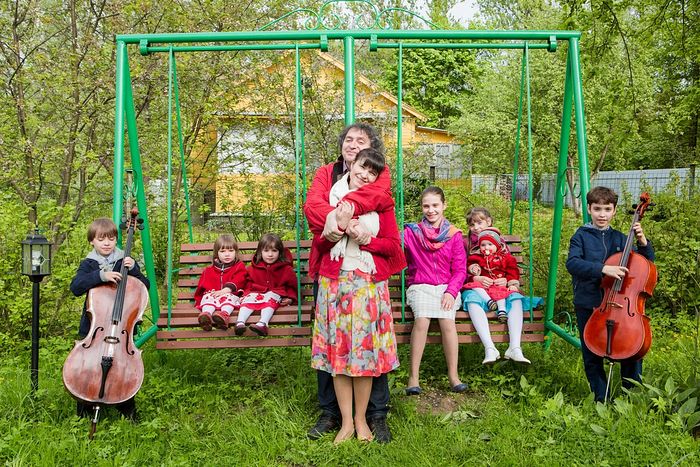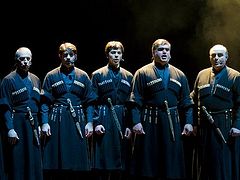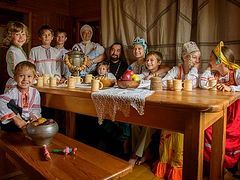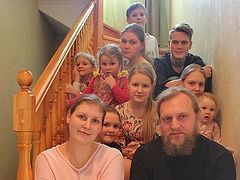All the members of the Gutman family are musicians. Music is an important part of the life of each of them—great-grandfathers, grandfathers, parents and children. But Sergey and Marina, the parents of seven children, are of the opinion that art is of secondary importance. For them children come first and the couple would never sacrifice them.
Sergey Julianovich, fifty-four, is a cellist and member of the Academy of Early Music Ensemble of the Moscow State Philharmonic Society;
Marina Nikolaevna, forty-one, is a graduate of the Music Department of Moscow Lenin State Teachers’ Training Institute.
They have been married for seventeen years.
Their children:
- Ekaterina, sixteen, a ninth grader of the Svetoch (“Light”, or “Torch”) Orthodox school;
- Fyodor, fourteen, an eighth grader (home-schooled);
- Maria, thirteen, a sixth grader of the same Orthodox school;
- Pavel (Charalampias in baptism), eleven, a fourth grader of the same school;
- Evfrosinia (Euphrosyne), seven, a first grader of the same school;
- Agnia, six;
- Tatiana, four.
Sergey Julianovich speaks:
This is my second marriage. My first marriage was childless as my ex-wife didn’t want children. Moreover we couldn’t agree on anything regarding matters of faith. After twelve years together I felt depressed and didn’t understand the purpose of our life. We had acquired and achieved all that we needed—but what next? A childless couple is a very unstable family structure—it is like a stool with two legs. Children make family more stable; that family can be compared to a three-legged stool. But we had no children, so no wonder that our marriage broke down. At the age of thirty-five I found myself alone. I had no idea what I was supposed to do next. I didn’t want to start my life anew, but I did want to hide from everything. But where? To a monastery.
When my father-confessor gathered a group for a pilgrimage trip to Diveyevo Convent, I joined them. There lived a clairvoyant eldress named Matrona in Diveyevo, and we (there were about five of us) were able to talk with her. Fr. Theodore asked her: “What should our Sergey do? He has failed in all spheres of life: His marriage has broken down and he now has problems with his job.” She replied: “Does anyone have a prayer rope?” It turned out that nobody but me had a prayer rope (I had bought it the day before at a monastery and taken it along). “Does anyone have a book or a newspaper?” Nobody but me had one either—I had bought a booklet entitled Orthodox Marriage the day before and taken it along. The eldress took the booklet and the prayer rope and started praying. A little while later she said, “Give him (Sergey) back the book.” And she kept the prayer rope. My father-confessor said, “Since I asked her, now I have to interpret her words. These words mean that you shouldn’t go to a monastery but should remarry.”
At that time I was a parishioner of the Church of St. Alexis the Man of God in Krasnoye Selo in Moscow. I was introduced to young ladies regularly, but I didn’t like any of them. But soon I spotted one young woman who attended our church and said to my father-confessor, “I would marry her.” We both were invited to Fr. Theodore’s place and introduced to each other. Her first impression of me was utterly negative: I was unshaven and wore a tie! My future wife said: “I have to think about it”, and went to the kitchen. She was washing the dishes and crying into the sink. Then she returned and said, “I agree.” It was later that my wife told me, “I had been praying that the Lord would arrange my life as He pleased. So I understood that it was the will of God.” We began to meet and communicate regularly and Marina finally started to like me. We were introduced to each other in January and married in Church on May 19 of the same year.
We did not have to “adapt to one another”—I felt from the very beginning as if we had always lived together. After our wedding my past life was entirely erased from my memory. I had a clear feeling, as if I had been married only to this woman and hadn’t had another marriage in my life. I even used to ask Marina: “How is it that you don’t know my grandfather?” And she used to reply: “But he died ten years ago!” I thought that my wife must know my entire life and I was surprised that she didn’t.
Our first baby was born ten months after our wedding. I was thrilled at the news that Marina was pregnant because I wanted to have children so much. When I came to the maternity ward to take Ekaterina from it, everyone kept saying to me: “Look, this is your baby!” I even didn’t want to make out whose nose and eyebrows the baby had and whether it took after me or my wife. I had a gut feeling that this child was God’s child rather than mine, that God gave this baby girl into my hands and not I who fathered her. And I had the same feeling after the birth of each child.
We build our whole life around our children. What did I have before my second marriage? An endless touring schedule. I would go on tours five to six times a year for a month or more—that is, I was away from home for half a year. When Ekaterina was still a nursling, I went to America for a month. In my absence Marina could barely manage the child, so we decided that this mode of life was not for us. I gave up everything and quit my music career for about eight years. I worked as a churchwarden and made some money on the side. And we moved from Moscow to the Moscow region because for children there are various disadvantages to living in the capital. What always ensured our integrity was the lack of division of duties in our family: “Dad earns the money, and mom takes care of the children”. On the contrary, we have “interchangeability” in our family—each of the parents does whatever he or she can do on a given day. If dad can make soup today, he does it. There was a period when our mom was the only breadwinner in the family. True, it hurts the male self-esteem, but the man’s ego is not the most important thing in the world. And the time came when I got back to my work, although I stopped touring. There is no doubt that art is an important thing, but children are far more important and interesting—these two are not even comparable.
We, the Gutmans, are a family of musicians. I tried to trace my ancestry and it turned out that all the ancestors I found were musicians. My father, Julian Gutman, was a renowned pianist; my grandfather, Prof. Theodore Gutman, first taught at Moscow Tchaikovsky Conservatory and then at the Gnessins Institute [now Gnessins Russian Academy of Music.—Trans.]. His father, David Gutman, was a musician and composer, too. We even have a transcript that he graduated from Vienna Conservatory. So our children had no chance of avoiding a musical education. Every time we had a new child we thought: “Perhaps we won’t pursue a musical education for this child.” But if your child has an aptitude for music, you have no right not to provide him with music lessons. If he had no capabilities, then he would engage in whatever he pleased. But since God has given him talents, they should be developed.
When it was time for our children to go to a music school, we realized that it was very expensive, namely 10,000 rubles [c. 156.5 US dollars] for each child per month. And when there are two, three, or four children?... Then we organized a choral school in Odintsovo [a town to the west of Moscow.—Trans.], at the Church of the Grebnya icon of the Mother of God. I became its director. It provided full-fledged training, including such subjects as musical literature and solfeggio. But above all the school gave priority to choir. Apart from secular music, children were taught liturgical music and participated in church services. This school existed for eight years and then the state took it under its patronage, so it merged with the music school of Odintsovo and became its choral department. Now sixty children learn there. Though I am not its principal anymore, I am its general manager since it is our brainchild.
 The children’s Paschal Liturgy
The children’s Paschal Liturgy
I cannot say that we don’t have financial problems, while I wouldn’t say that we live from hand to mouth either. If the Lord has performed this miracle by giving you children, the rest will surely take care of itself. After the birth of each new child we had new sources of income. Our standard of living never went down after a new addition to our family. Our situation improved every time. He who doesn’t trust God should make efforts to find solutions and get out of a scrape on his own. And nobody guarantees that he will succeed. But if he confides in God, the Latter won’t let him down. There are many families with four and five children among our acquaintances, and none of them go hungry.
Children are brought up by example. They observe the way we live. As you live, so will they live. Children do an invaluable favor to their parents by helping them see their own sins. It is very difficult to look into your soul and understand your sins. But as you look at your children, you see that their faults are your faults. One should keep in mind that all the faults of your little one are yours. If you want to improve your child, first improve yourself.
You cannot send your child to the best school and not be aware of what he lives there by. Otherwise a total stranger instead of an educated person will return from it. Parents should live a common life with their children—rest, work, walk, pray together and so on. And of course, they need to find individual time for each of the children, at the very least half an hour per day. Children appreciate it when you do something together, when you are alone with them, and they will remember this for the rest of their lives. When Fyodor was five, I stayed with him at the hospital for two days. Now he is fourteen, but he still recalls this as an important event in his life.
A large family is a self-sufficient team. While the children are cheerful and enjoying themselves, the parents’ minds are at ease. At some period we put so much time, energy and emotion into children, and in due time all of this will be repaid a hundredfold. I like it when our children invite my friends to their birthdays. If we have common friends, then we have lots of common interests, and there is a chance that when the children grow up we will remain close with them. Though I try to keep in mind that children are not our “possessions” and that at some point they may drift away from home and distance themselves from us. It is not in our power to change this situation—all we can do is put up with it and accept it.
Marina Nikolaevna:
I was born in the city of Smolensk. When I was a girl, one to two children in a family were considered a norm. There was one family in our city which had eleven children. Although I was not acquainted with any of them, all of my cousins and other relatives studied, worked or had some contact with at least some of them. Their surname, “Isachenkov”, was a household name. A family with eleven children really caught my admiration in my childhood. I kept thinking: “How can it be?” And I carried this admiration with me until I got married. And when I gave birth to the first child I was worried that we might not have any more children. But the second and the third children followed… Each new child caused us to feel ever greater amazement—in a childish and naïve form. The fourth? The fifth?! Is it really possible? We rejoiced at the news of each pregnancy and took it as a blessing and a miracle. And can we really have six, seven children?! I still cannot understand why we were astonished every time! Perhaps because each time we thought that it was the last child. But suddenly new ones appeared over and over again.
Once an acquaintance of mine congratulated me on some holiday and wished me interesting travels. I answered him: “My most interesting journeys are to the dentist and to the maternity home.” It was no joke, and I was telling him the truth. Our journeys to the maternity hospital were the happiest times I have ever spent with my husband alone. I couldn’t “part” with Sergey for a long time, so we would fly into the admission room at the last moment, having previously visited all the local cafes and restaurants. This would happen as if by itself. When labor pains begin, we decide who will stay with the children while we are away, arrange other things, and leave. But as soon as we leave home, the pains go away. But once we’ve arrived to Moscow, we dare not go back to the Moscow suburbs—what if the labor pains recur? We drop in at a café. And contractions do recur! But I think that I’d rather spend more time with my husband instead of lying in hospital for eight hours. After spending some time at the first café we go out and visit another café, while my contractions continue. This may take a whole day. On one occasion we visited cafes and restaurants in this way for two days—it was so romantic! Once, when we were sitting at a café, my contractions increased in intensity, so I started breathing to cope with them. The café manager came up to us and said, “I see you are in labor. I used to work as a midwife, but I am sorry I am not ready to assist you in childbirth now!” We reassured her that all would be well. And all went well: we arrived at the maternity home just in time.
When a woman bears and breastfeeds her baby, she stands high in her household’s esteem. When a woman is pregnant, her husband gives her his full attention, realizes that she needs good care and tells the children about it all the time. The fact that a mother, a woman needs support is embedded deep in her consciousness. And this considerate attitude is implanted in families with many children. When there are few children, the woman is seemingly always in her element: she can manage this and that and it looks like she doesn’t need any protection. So the children grow up without a protective attitude towards women.
Learning to do what is necessary for somebody else and not yourself requires much effort. In large families children are taught this from birth. I try to delegate some of the duties to the children because I perform lots of duties myself. Logistics alone counts for a lot! Each child learns two musical instruments, and school for all of them finishes at different times. I need to compare their school timetables, work out schedules and trace the trajectory of movements… In addition, I help them do their homework in music: we learn solfeggio, practice musical instruments together, etc. So we have to solve domestic problems together. It usually goes this way: I come home in the evening to find a mess there. I say: “Children, please put your work aside for a while. I need your help. Let us clock fifteen minutes with a timer and clear the surfaces. You clear the table, you clear the sofa, you sort out the shoes and bags in the hallway, you take the vacuum cleaner, you load the dishwasher.” And I assign some task to myself too. And we tidy up our home within fifteen minutes. If I did it alone, without seven helpers, it would take me two hours. Everybody sees the result: after a quarter of an hour the apartment looks different because we have worked together as a team. This is my method of parent education.
Dividing up the household duties and responsibilities, we consider the children’s traits and abilities. For instance, Ekaterina is able to concentrate and do her work promptly. If we charge her with getting the younger children ready for school in the morning, we can rest assured that she will wake them up on time, take them to the bathroom to brush their teeth, plait their hair, and the children will leave home on the dot. But Ekaterina only “takes part in short races” and that is the most she can do, so Maria takes the lead. Maria likes to help her siblings in their studies, she does it in the form of a game and she has a way with each of them. Though she is seemingly playing, the process works. This girl clearly has teaching abilities. Pavel sees to it that everybody feels comfortable and he feels uneasy once someone has fallen behind. If anyone needs help, he is on the spot, ready to fetch, take away, give something to somebody or do something urgently… Though Pavel is our fourth child, he can restrain his ego and ensure that everybody around him feels comfortable. I can rely on him; he began to walk with the younger girls from the age of nine. Fyodor is the second child. He is fourteen and he “has his head in the clouds”. Subtle and creative, he has a delicate perception of music and colors. He narrates very beautifully, but in order to help us about the house he first needs to “come down to earth”—then he is an irreplaceable help.
For our music lessons we search for good teachers who work in different schools. The first instrument for all our children is the piano. Natalia Bakinskaya is a very talented teacher who inspires us and prepares our children for music competitions. The children’s second instruments vary: Ekaterina and Agnia play the flute, Fyodor learns the cello, Evfrosinia chose the violin, and Pavel—percussion instruments. Tatiana is only beginning her lessons. Maria plays only one instrument, but she wins first prize in national and international competitions. Wherever she goes, she becomes a prize-winner. She wants to learn a second instrument, but we spare her strength and discourage her from doing this at this stage. Apart from contests, school takes a lot of time (Maria is at the top of her class). And girls who are “A” students worry very much when they slip and become “C” students. We may add the harpsichord for her once we have found a worthy teacher. She would like to play old music.
The worst punishment for our children is their parents’ coldness. Then they begin to understand that something has gone wrong and the situation must be changed. The children above all learn to ask for forgiveness. They see it in my personal example, too: Whenever I punish one of my children, I ask for his or her pardon after that. I may be too emotional as a parent, though I punish them according to their deserts. The children should understand that I love them despite these punishments.
Teenagers’ emotions are often over the top; like volcanoes they give vent to their feelings and all that is inside them. These emotions are often frightening, but at least children see what is inside them and can do something about this. We parents see this too and can correct the situation. After all, there are no “children’s problems”—there are only children-and-parents’ problems. In most cases what children pour out is ours, and we adults have learned to hide our feelings. We control ourselves and don’t give free rein to our emotions, but children cannot yet do that. How can we help them improve? By improving ourselves and changing for the better. Thus we reach out to one another—children show us our weaknesses and we help ourselves and our children overcome them.
 Fyodor, Ekaterina, dad and Pavel in the orchestra
Fyodor, Ekaterina, dad and Pavel in the orchestra
Having many children strengthens a marriage. Both the husband and the wife realize that they are very important to each other and they won’t survive without mutual help. Why do people quarrel? Because of mutual reproaches. “You must do this, but must I really do the same?”—“You can’t cope with your duties!”—“And do you do all your chores?” If things like this occur in a large family, it will collapse. As for us, we don’t have a division of duties; all of us cook the porridges, bathe the babies, stroll with them, etc. Each of us keeps in mind that there will be a need to lend a hand at any moment because otherwise you won’t be able to cope. A caring husband gives his wife unique strength, which will be enough for both the children and the husband. The woman has enormous reserves, she just needs a little support and the words, “We need you.” Her love and attention will suffice for everybody and everything.












